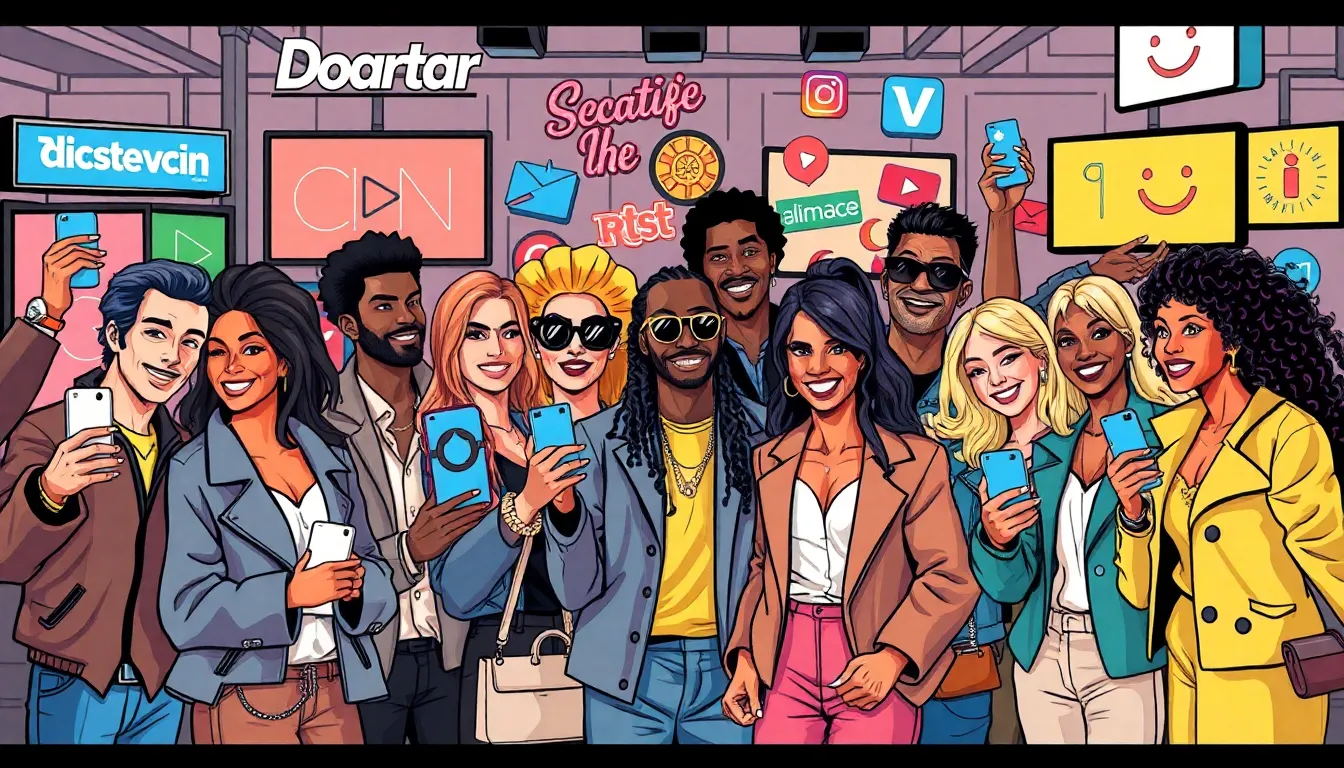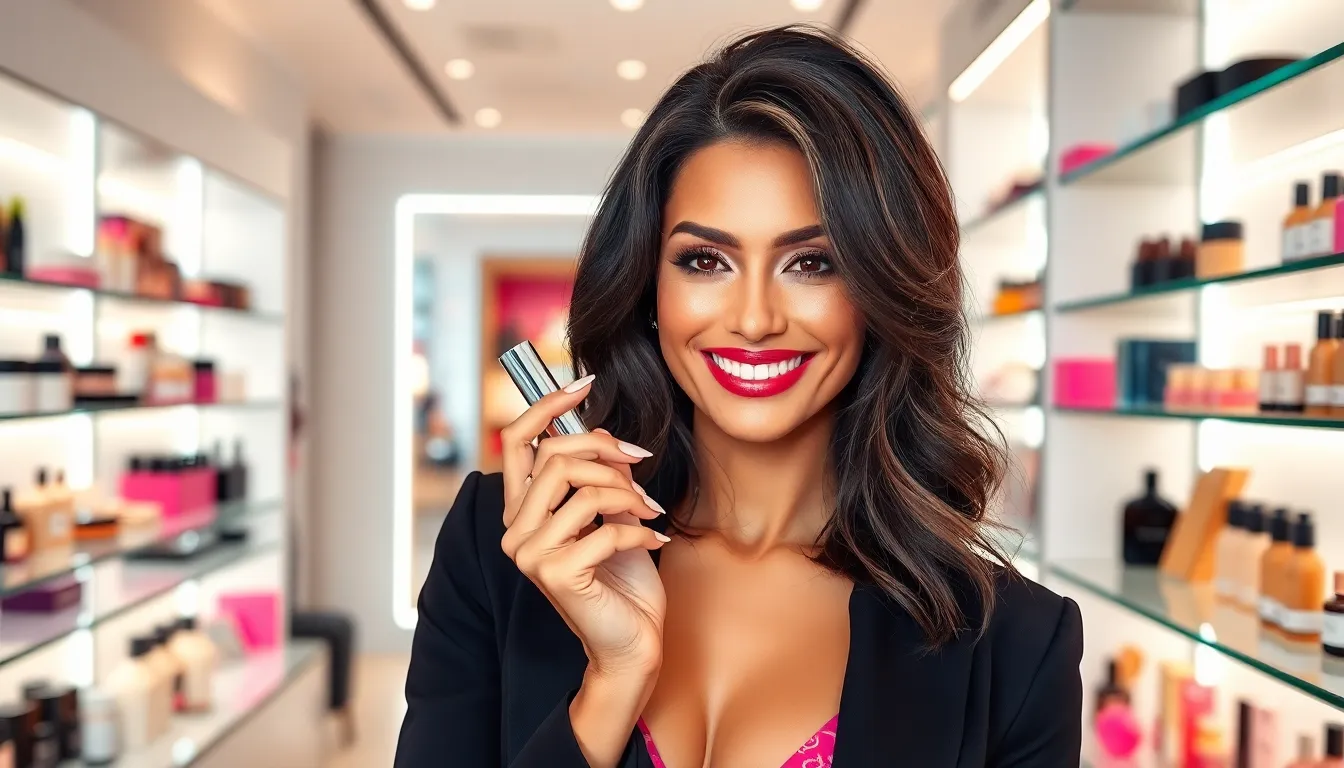In a world where everyone’s a brand and every brand wants to be a celebrity, the rise of celebrity brands is nothing short of a phenomenon. From reality TV stars launching beauty lines to musicians creating their own clothing lines, it seems like everyone with a hint of fame is cashing in on their star power. But what’s the secret sauce behind these ventures?
Celebrity brands aren’t just about a pretty face or a catchy name; they tap into the unique connection stars have with their fans. When a beloved figure endorses a product, it feels less like a sales pitch and more like a friendly recommendation from a trusted buddy. So, let’s dive into the glitzy world of celebrity brands and uncover what makes them tick, why they succeed, and how they’ve changed the landscape of marketing forever.
Table of Contents
ToggleOverview of Celebrity Brands
Celebrity brands refer to product lines or services created by well-known individuals. These brands vary widely, ranging from fashion and beauty items to beverages and home goods. Famous personalities leverage their public visibility and fan loyalty to establish these brands. The credibility celebrities possess often translates into consumer trust, turning endorsements into personal recommendations.
Market dynamics showcase how celebrity brands often achieve significant sales figures. For example, Kylie Jenner’s beauty brand, Kylie Cosmetics, generated over $200 million in its first year. Such revenue highlights the potential impact a celebrity can have in business. Similarly, George Clooney’s Casamigos Tequila gained a dedicated following, selling for $1 billion in 2017.
Innovative marketing strategies frequently maximize reach and engagement within this landscape. Social media platforms like Instagram serve as vital tools for these brands, allowing celebrities to directly connect with fans. Engaging content, such as behind-the-scenes looks or personal anecdotes, fosters a sense of intimacy.
Moreover, collaborations between celebrities and established companies often enhance brand credibility. Rihanna’s Fenty Beauty partner with LVMH exemplifies how these partnerships can blend brand equity with celebrity influence. Exclusive collections promote excitement and urgency among consumers, driving sales.
Lastly, understanding the challenges is essential for maintaining long-term success in this evolving market. Brand image management, shifts in consumer preferences, and market competition present ongoing hurdles that require strategic focus. Celebrity brands thrive on innovation and adaptability, ensuring they remain relevant within the competitive landscape.
The Rise of Celebrity Brands


Celebrity brands gained significant traction in recent years as influencers turned entrepreneurs. Famous individuals leverage their fame to create product lines, connecting deeply with their audience.
Impact of Social Media
Social media platforms transformed how celebrities promote their brands. Platforms like Instagram enable celebrities to engage directly with fans, sharing product launches and personal stories. About 80% of Instagram users follow at least one celebrity, illustrating the immense reach these brands can achieve. Celebrities craft visually appealing content to attract attention and drive consumer interest. Additionally, user-generated content further amplifies brand visibility, encouraging fans to share their experiences. This engagement often leads to increased sales, demonstrating the effectiveness of social media in brand marketing.
Changing Consumer Behavior
Consumer behavior has shifted as authenticity becomes more vital. Shoppers prefer brands that resonate with their values and lifestyles, making celebrity endorsements feel like personal recommendations. Studies indicate that 79% of consumers trust recommendations from their favorite celebrities over traditional advertisements. They seek relatable connections with brands, enhancing loyalty and repeat purchases. Furthermore, social responsibility plays a role in purchasing decisions, with many consumers favoring brands that raise awareness for causes. This evolution in consumer sentiment influences how celebrity brands position themselves in the market.
Notable Celebrity Brands
Celebrity brands significantly influence various industries. Numerous celebrities successfully leverage their fame to create impactful products that resonate with fans.
Fashion Brands
Rihanna’s Savage X Fenty revolutionizes lingerie, emphasizing inclusivity and body positivity. Celebrities like Kim Kardashian also excel with SKIMS, which focuses on shapewear that flatters diverse body types. The appeal of these brands stems from authentic representation and alignment with consumer values. Each brand relies on innovative marketing strategies that showcase products on social media, enhancing visibility. Notably, endorsements from celebrities create a sense of trust, transforming casual shoppers into loyal customers.
Beauty Brands
Kylie Jenner’s Kylie Cosmetics set a benchmark in the beauty industry, generating over $300 million in revenue within its first 18 months. Through compelling social media campaigns, she connects with fans and encourages their engagement. Additionally, Jennifer Lopez launched JLo Beauty, centered around natural ingredients that promote radiant skin. Each beauty brand thrives on personal narratives that reflect the unique identities of the celebrities behind them. Authentic storytelling reinforces brand loyalty and encourages repeat purchases.
Food and Beverage Brands
George Clooney’s Casamigos Tequila exemplifies success in the beverage sector, sold for $1 billion in 2017. This venture highlights the power of celebrity appeal in a crowded market. Similarly, Selena Gomez’s Rare Beauty extends beyond cosmetics, promoting mental health awareness while offering products. Celebrity endorsements in the food and beverage industry enhance consumer connection through shared values. Trust in these brands fosters lasting relationships with consumers, pushing them to become brand advocates.
The Business of Celebrity Brands
Celebrity brands thrive through unique marketing strategies and innovative partnerships. Notable business models revolve around brand endorsements and licensing deals, which significantly contribute to their success.
Brand Endorsements
Endorsements serve as a primary strategy for celebrities, allowing them to leverage their influence. Celebrities help brands reach wider audiences by promoting products they genuinely use. According to a recent study, 49% of consumers depend on celebrity endorsements to inform their purchasing decisions. Engagement increases as fans see these endorsements as personal recommendations rather than traditional ads. Campaigns featuring celebrities often pair them with relatable product stories, enhancing authenticity. For instance, brands frequently collaborate with celebrities whose lifestyles resonate with their target demographics. This alignment fosters trust and often results in increased sales.
Licensing Deals
Licensing deals represent another lucrative avenue for celebrity brands. Celebrities partner with established companies, granting them rights to use their names or images on products. Such agreements capitalize on the celebrities’ existing fan bases, driving sales while reducing upfront costs for the celebrity. An example includes Rihanna, who launched Fenty Beauty through a partnership with LVMH, which allowed rapid brand expansion. Companies benefit from instant recognition while celebrities reap financial rewards without direct involvement in product creation. Licensing structures typically provide lucrative royalty percentages, making this model appealing for both parties. Enhanced visibility often springs from these collaborations, leading to mutual growth.
Challenges Facing Celebrity Brands
Celebrity brands encounter various challenges in maintaining relevance in today’s competitive market. Addressing these issues is crucial for sustained success and brand loyalty.
Market Saturation
Market saturation presents a significant challenge for celebrity brands. With numerous celebrities launching products in overlapping industries, standing out proves increasingly difficult. For instance, the beauty sector alone features thousands of brands, many owned by celebrities. This saturation often leads to fierce competition, making differentiation critical. Successful brands emphasize unique selling propositions, such as product quality or targeted audiences. Additionally, strategies involving collaborations with smaller brands or exclusive product lines can capture consumer attention. Engaging storytelling through marketing also enhances interest and aids in penetrating a crowded marketplace.
Maintaining Authenticity
Maintaining authenticity poses another formidable challenge for celebrity brands. As consumers grow more discerning, they demand genuine connections with brands. Celebrities must effectively align their products with their personal values to avoid disconnection from their fan base. Authentic engagement on social media plays a vital role in fostering trust. Brands that promote transparency and advocate for social responsibility resonate more with consumers. Celebrities like Rihanna and Kim Kardashian successfully leverage their personal stories to create relatable narratives. By prioritizing authenticity, these brands can cultivate loyalty and enhance long-term consumer relationships.



